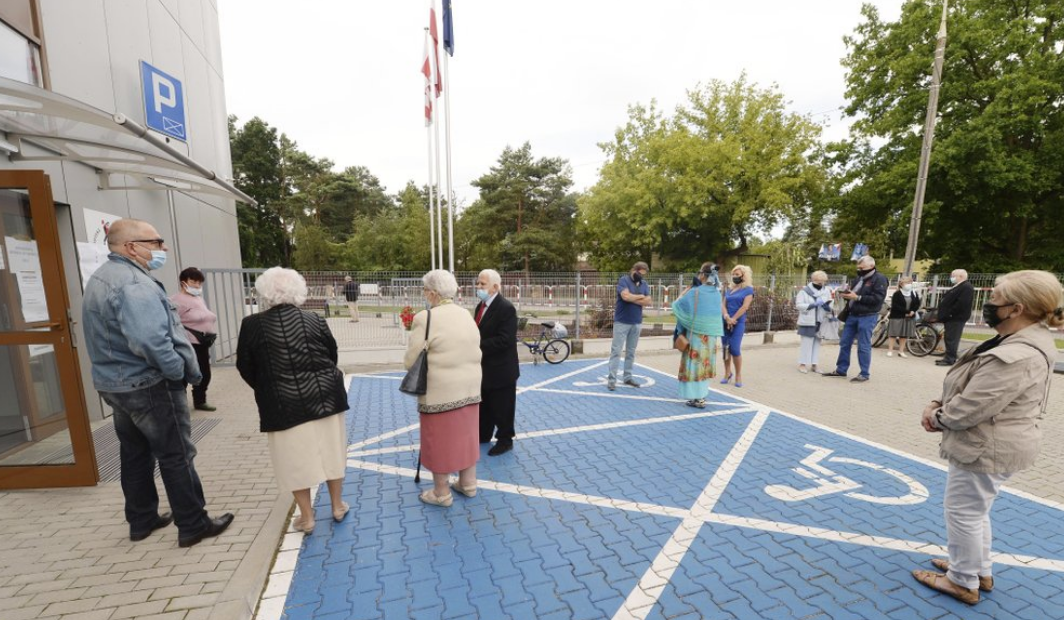
The presidential runoff election on Sunday in Poland is seen as an important test of populism in Europe. Andrzej Duda, above, is hoping for re-election. /AP
The presidential runoff election on Sunday in Poland is seen as an important test of populism in Europe. Andrzej Duda, above, is hoping for re-election. /AP
Poland's razor-blade-close presidential election runoff voting between the conservative incumbent, President Andrzej Duda, and liberal, pro-European Union Warsaw Mayor Rafal Trzaskowski, started Sunday. It is set to conclude on Sunday, following a bitter campaign dominated by arguments over populism, which have exacerbated the country's liberal-conservative divide.
Incumbent president Andrzej Duda is backed by the ruling right-wing party and the government, as he seeks a second five-year term. Trzaskowski, a former European Parliament lawmaker, runs for the main opposition Civic Platform party that was in power in from 2007 to 2015, who came second in the first round of voting in late June. Both candidates are 48.
Should Duda win, PiS will retain control of the majority of Poland's institutions, allowing the party to push forward with changes to the country's constitution. If Trzaskowski, who belongs to the centrist Civic Platform party, wins, he has vowed to restore constitutional norms, bringing the country closer to the European Union (EU).

Voters, wearing masks and keeping distance for protection against the coronavirus, wait in line to cast their ballots outside polling stations in Lomianki near Warsaw, Poland, July 12, 2020. /AP
Voters, wearing masks and keeping distance for protection against the coronavirus, wait in line to cast their ballots outside polling stations in Lomianki near Warsaw, Poland, July 12, 2020. /AP
In the first round of voting, Duda won 43.5 percent of the vote, while his rival landed 30.5 percent – but Trzaskowski is expected to get the bulk of the centrist votes that went to the eliminated candidates, making the race particularly tight.
"We should vote because otherwise we have no right to complain about our politics," said Eugeniusz Kowalski, 67, a retired office clerk.
The voting is being held under strict sanitary conditions due to the still spreading coronavirus. Poland has registered over 37,000 infections and almost 1,600 deaths.
Voting stations remain open until 9 p.m. local time (1900 GMT), when exit polls will be released. The final official results are expected early in the week. The outcome of the election will decide the shape of politics in deeply divided Poland at least until 2023, when parliamentary elections are scheduled.
Latest polls showed that the race may be decided by a very small margin. Amid calls from both sides to some 30 million eligible voters to cast ballots, turnout is expected to be higher than the 64.51% in the first round on June 28.

Trzaskowski is running against conservative incumbent Duda, who is seeking reelection. /AP
Trzaskowski is running against conservative incumbent Duda, who is seeking reelection. /AP
EU Tensions
The president has a key role in both foreign policy and a veto power over laws passed by parliament. During his five-year-term, Duda has approved laws giving PiS vast new powers over Poland's top courts and key judicial bodies, bringing the country into conflict with the EU.
Brussels has challenged Poland, saying the changes violate the democratic principle of separation of powers. Warsaw has continued with most measures regardless, arguing it has a mandate from voters to reform the country's justice system.
LGBT Rights
Over the campaign, Duda has made his opposition to LGBT rights a key theme.
On Monday, Duda moved from rhetoric into policy, formally proposing a constitutional amendment that would bar same-sex couples from adopting children, a policy that could appeal to Poland's Catholic majority.
Duda and PiS have largely garnered the backing of older and rural Poles, helped by a generous welfare program. "These last five years have been a good time that we have used well," Duda told supporters at a rally on Monday. "I want to continue this policy – for the family, for the development of Poland, for the development of all generations of my countrymen."
Trump and Obama
Poland's election is reflecting the divide that has dominated U.S. politics for the past few election cycles, a notion not lost on the candidates.
Last month, Duda met with the U.S. President Donald Trump, the first foreign leader to do so after the coronavirus outbreak. And the American praised his counterpart for doing a "terrific job" while in office.
While Trzaskowski has sought to boost his own standing by calling former-President Barack Obama, during which they discussed the importance of Poland's democracy.
Bitter race
Over the course of the campaign, Duda has been accused of courting the nearly seven percent of voters who supported the far-right candidate, Krzysztof Bosak, who was eliminated in the first round.
Earlier in the week, Trzaskowski accused Duda of running a "cynical campaign against those people on the margins," vowing to "stand on the side of those being attacked."
The divide is so deep that the two could not agree to the conditions for a televised debate. Trzaskowski refused to debate his rival on the state broadcaster, while Duda refused to go on independent U.S.-owned broadcaster, TVN.
Ultimately, each candidate held his own show, each in a friendly TV studio, taking questions alone as a lectern labeled with the rival's name stood empty beside them.
The election was originally scheduled for May but postponed due the coronavirus pandemic. Poland has suffered more than 37,000 cases of COVID-19 and more 1,500 deaths. Despite this, PiS Prime Minister Mateusz Morawiecki last week urged older Poles to vote, stating "there is nothing to be afraid of."
Cover image via AP
(With input from agencies)